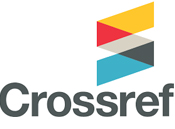The Effect of Using the Think Pair Share Model Toward Students’ Mathematic Communication Ability Derived from Their Leaning Motivation
Abstract
This study to investigate whether there are differences in mathematical communication skills between students who take Think Pair Share learning and students who follow conventional learning when viewed from the learning motivation of students at SMP Negeri 4 Tambang. This study is a quasi-experimental study that aims to investigate a causal relationship by giving treatment to one class and comparing the results with one class that is given a different treatment. The subjects in this study were students of class VIII-G and class VIII-E of SMP Negeri 4 Tambang and the object of this research was the influence of the application of the Think Pair Share learning model on students' mathematical communication skills in terms of learning motivation. The data analysis technique used by the researcher is t-test, correlation (Product Moment), and two-way ANOVA. The instrument used is a description test to measure students' mathematical communication skills, and a questionnaire to measure the level of student motivation. Based on the results of the study, it was concluded that (1) there were differences in communication skills between students using the Think Pair Share learning model and students using conventional learning models (2) there were differences in student motivation in the experimental class and the control class (3) there was a contribution between learning motivation and metamatic communication. . (4) there is no interaction between the learning model and student motivation on students' mathematical communication skills. Thus, in general, the Think Pair Share learning model has an effect on mathematical communication in terms of student motivation at SMP Negeri 4 Tambang..
References
A. Jihad, Pengembangan Kurikulum Matematika. Bandung: Multi Pressindo, 2008.
Kementerian Pendidikan dan Kebudayaan, Standar Isi Untuk Satuan Pendidikan Dasar dan Menengah. Indonesia, 2006.
A. Mahmudi, “Komunikasi Dalam Pembelajaran Matematika,” . J. MIPMIPA UNHALU, vol. 8, no. 1, pp. 1–9, 2009.
M. Darkasyi, R. Johar, and A. Ahmad, “Peningkatan Kemampuan Komunikasi Matematis dan Motivasi Siswa dengan Pembelajaran Pendekatan Quantum Learning pada Siswa SMP Negeri 5 Lhokseumawe,” J. Didakt. Mat., vol. 1, no. 1, pp. 21–34, 2014.
W. Made, Strategi Pembelajaran Inovatif Kontemporer: Suatu Tinjauan Konseptual Operasional. Jakarta: Bumi Aksara, 2009.
A. Rasyad, Teori Belajar dan Pembelajaran. Jakarta: UHAMKA Press, 2003.
T. I. B. Al-Tabany, Mendesain model pembelajaran inovatif, progresif, dan kontekstual. Jakarta: Kencana Prenadamedia Media Group, 2014.
J. Vitriani, “Pengaruh Penerapan Model Pembelajaran Kooperatif Tipe Think Pair Share (TPS) Terhadap Kemampuan Komunikasi Matematika Siswa Kelas VIII SMPN 13 Padang Tahun Pelajaran 2013/2014),” Universitas Negeri Padang, 2014.
Y. E. Rizki, Nurhanurawati, and P. Gunowibowo, “Pengaruh Penerapan Model Pembelajaran Kooperatif Tipe Think Pair Share (TPS) Terhadap Kemampuan Komunikasi Matematis Siswa (Studi pada Siswa Kelas X Semester Ganjil SMK Muhammadiyah 2 Bandar Lampung Tahun Pelajaran 2012/2013),” J. Pendidik. Mat., vol. 2, no. 1, pp. 37–44, 2013.
A. Suprijono, Cooperative Learning Teori dan Aplikasi PAIKEM. Yogyakarta: Pustaka Pelajar, 2009.
H. B. Uno, Teori Motivasi dan Pengukurannya. Jakarta: Bumi Aksara, 2007.
A. Shoimin, 68 Model Pembelajaran Inovatif dalam Kurikulum 2013. Yogyakarta: Ar-Ruzz Media, 2014.
M. Thobroni, Belajar & Pembelajaran Teori dan Praktik. Yogyakarta: Ar-Ruzz Media, 2015.
N. Hanafiah and C. Suhana, Konsep Strategi Pembelajaran. Bandung: PT Refika Aditama, 2012.
A. M. Sardiman, Interaksi dan Motivasi Belajar Mengajar. Jakarta: Rajawali Pers, 2018.
O. Hamalik, Proses Belajar Mengajar. Jakarta: Bumi Aksara, 2008.
Copyright (c) 2021 Journal of Research on Mathematics Instruction (JRMI)

This work is licensed under a Creative Commons Attribution-NonCommercial-ShareAlike 4.0 International License.






